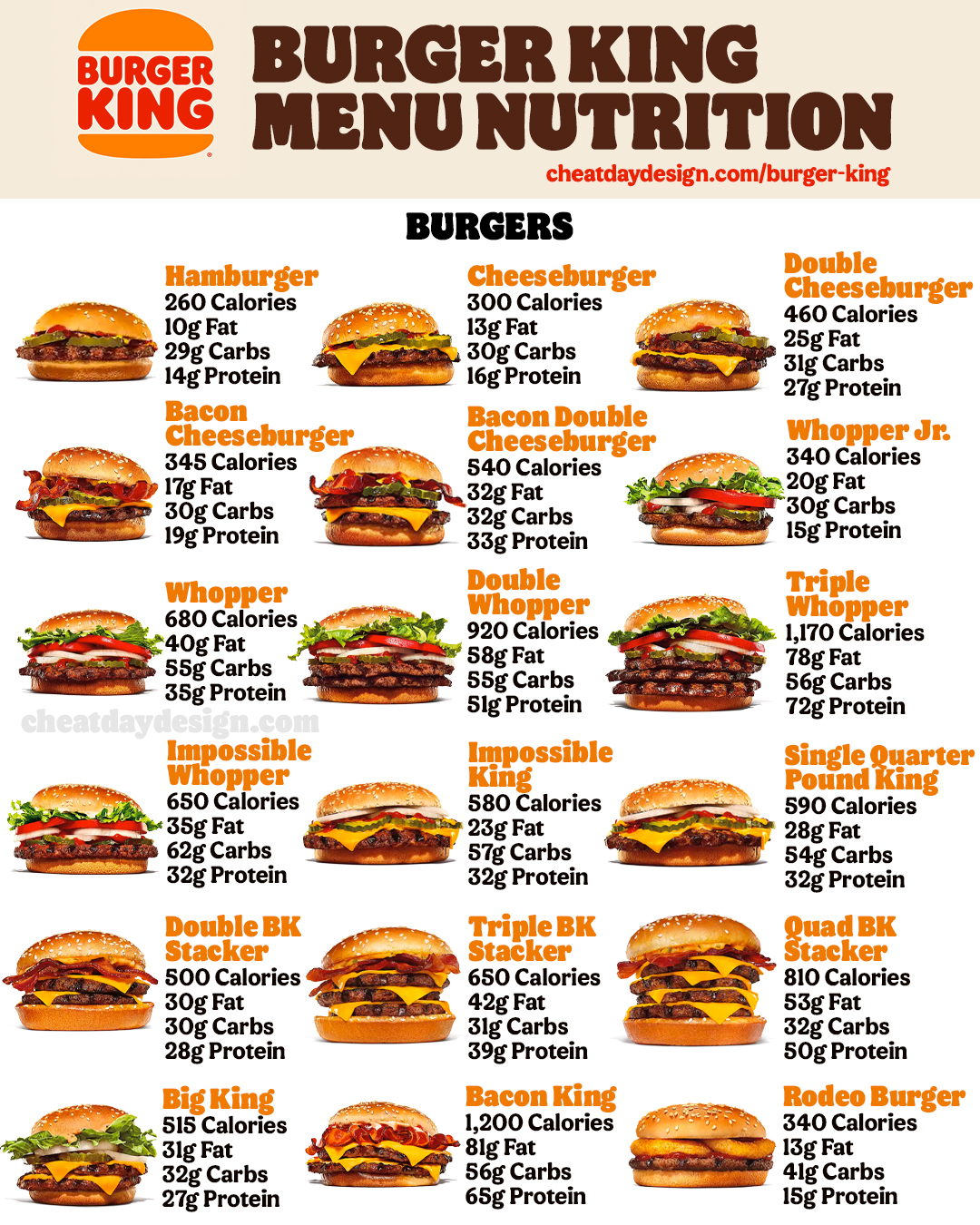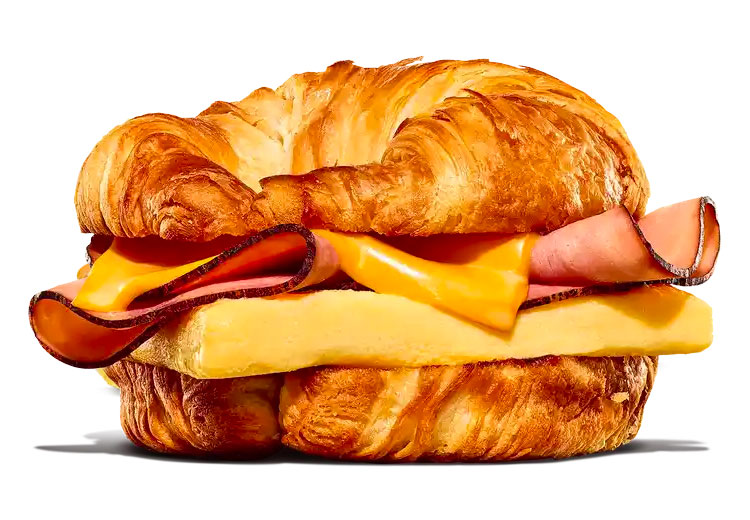If you’re conscious about your diet or aiming to maintain a healthy lifestyle, fast food might not be your first choice. However, just because something isn’t ideal doesn’t necessarily mean it’s bad. Burger King offers a wide range of options on their menu, which means there’s a chance you can find a meal that suits your goals.
At Hook’d Up Bar and Grill, we believe in flexible dieting. We’re all about moderation and understanding that every food is acceptable in moderation. Whether it’s Burger King, Chick-fil-A, Wendy’s, McDonald’s, or any other restaurant, you can indulge and still maintain a healthy lifestyle.
Today, let’s dive into the Burger King menu as of January 2023 to explore the calorie and nutrition information. Please note that the calorie and macro information provided is based on cross-referencing the data available on the Burger King website. We have done our best to ensure accuracy and relevance.
Understanding the Nutritional Breakdown
As we explore the Burger King menu, we’ll focus on the calories and macronutrients (total fat, carbs, and protein). For simplicity’s sake, we’ll mainly discuss the macro-focused approach. If you’re interested in other aspects like trans fat, saturated fat, or sodium content, we recommend visiting the Burger King website for specific information.
Calories and Nutrition Facts for Burger King Burgers

Many people are surprised to learn that Burger King’s burgers are relatively low in protein and high in fat. For example, the iconic 100% beef, flame-broiled Whopper may seem protein-packed, but it actually contains 670 calories and only 31g of protein.
It’s important to note that the nutrition information provided for each burger includes condiments. Typically, this includes ketchup and mustard, but certain sandwiches may also include mayo, which adds extra calories. To have more control over your calorie intake, consider ordering a burger without condiments and adding your own.
Let’s compare the Whopper and the Impossible Whopper. The regular Whopper contains 680 calories, while the Impossible Whopper has 650 calories. Both burgers have similar nutritional profiles, with the regular Whopper having slightly more fat, fewer carbs, and slightly more protein than its plant-based alternative. The choice between the two comes down to personal preference.
It’s worth noting that plant-based doesn’t automatically mean healthier in terms of calories and macronutrients. The Whopper options show that plant-based alternatives can be similar to their meat counterparts.
When it comes to the highest and lowest calorie burgers at Burger King, the Bacon King takes the crown with a staggering 1,200 calories. This burger features 81g of fat, 56g of carbs, and 65g of protein. On the other hand, the Hamburger is the lowest calorie burger with just 260 calories, 10g of fat, 29g of carbs, and 14g of protein. For a more macro-balanced option, the Bacon Cheeseburger provides 345 calories, 17g of fat, 30g of carbs, and 19g of protein. Alternatively, the Double Cheeseburger offers 410 calories and 24g of protein.
Calories and Nutrition Facts for Burger King Chicken

Although Burger King is renowned for its burgers, they have recently expanded their chicken offerings. Alongside classics like nuggets and Chicken Fries, they have introduced new chicken sandwiches.
In 2022, they introduced the Ch’King Sandwiches, which boasted over 1,000 calories each. However, in 2023, Burger King revamped their chicken sandwiches, and the new BK Royal Crispy Chicken Sandwich contains just 610 calories.
If you’re looking for variations of the Original Chicken Sandwich, Burger King now offers an American, Italian, and Mexican version. However, these sandwiches contain approximately 30g of protein, similar to most of the burgers on the menu.
Unfortunately, Burger King doesn’t offer any grilled chicken options. If you’re craving a grilled chicken sandwich, you’ll need to visit places like Chick-fil-A.
The highest calorie chicken option at Burger King is the BK Bacon and Swiss Cheese Royal Crispy Chicken. With 820 calories, 48g of fat, 56g of carbs, and 46g of protein, it may not be the healthiest choice in terms of protein content. However, if calories aren’t a concern for you, this sandwich can satisfy your taste buds.
If you’re looking for a low-calorie chicken option, the 4-piece Chicken Nuggets come in at 190 calories, with 12g of fat, 11g of carbs, and 9g of protein. Although the protein content may not be impressive, these nuggets offer a relatively low-calorie snack.
For a more macro-balanced chicken option, the Chicken Fries are an excellent choice. With 260 calories, 13g of fat, 20g of carbs, and 15g of protein, they provide a decent balance of nutrients. If you prefer chicken nuggets, consider opting for the Chicken Fries as a slightly lower carb alternative.
Calories and Nutrition Facts for Burger King Sides and Sauces

No burger is complete without a quality side. Burger King offers options like French Fries, Onion Rings, and Mozzarella Sticks to accompany your meal. However, please note that Burger King has discontinued their salads as of now.
When choosing sides, keep in mind the amount of dipping sauce you use. While medium fries may contain around 500 calories, adding two sides of honey mustard sauce can quickly add an extra 200 calories to your meal.
The highest-calorie side at Burger King is the 8-piece Mozzarella Sticks, which contains 630 calories, 29g of fat, 67g of carbs, and 26g of protein. Surprisingly, these deep-fried sticks also provide more protein than an Original Chicken Sandwich with fewer calories.
If you’re looking for a lower-calorie side option, the Value Size Onion Rings are a great choice. With 205 calories, 9g of fat, 27g of carbs, and 3g of protein, they provide a satisfying crunch without excessive calories. Compared to a small side of fries containing 405 calories, the onion rings are a lower-calorie alternative.
If you’re seeking a well-balanced side, Chicken Fries are an excellent choice. With 260 calories, 13g of fat, 20g of carbs, and 15g of protein, they offer a solid nutrition profile. If you prefer a lower-carb option, Chicken Fries contain fewer carbs than an 8-piece nugget side.
Calories and Nutrition Facts for Burger King Breakfast

Breakfast is the most important meal of the day, and Burger King has expanded its menu to offer a variety of options. Whether you prefer ham, bacon, sausage, or a combination of the three, Burger King has a sandwich on either a croissant, biscuit, or tortilla to satisfy your breakfast cravings.
Unfortunately, Burger King doesn’t offer egg white options or lower-calorie alternatives like English Muffins. However, they do offer French Toast sticks and pancakes for those with a sweet tooth. Pair your breakfast sandwich with hash browns and iced coffee for a complete breakfast experience.
The highest-calorie breakfast sandwich at Burger King is the Double Sausage, Egg, and Cheese Biscuit. With 855 calories, 66g of fat, 34g of carbs, and 33g of protein, it’s a substantial option. The Egg-Normous Burrito is a close second with 805 calories, but the Double Sausage Biscuit takes the lead.
On the other end of the spectrum, the Egg & Cheese Croissan’Wich is the lowest-calorie breakfast sandwich, with 320 calories, 18g of fat, 29g of carbs, and 13g of protein. Although the fat content may be a bit high due to the buttery croissant, it provides a relatively low-calorie breakfast option.
For a more balanced breakfast sandwich, consider the Ham, Egg, & Cheese Croissan’Wich. With 405 calories, 22g of fat, 31g of carbs, and 21g of protein, it offers a decent protein boost without an excessive calorie count.
Calories and Nutrition Facts for Burger King Sweets
When it comes to sweet treats at Burger King, it’s clear that there can be a substantial difference in calorie count between items like milkshakes and small ice cream cones. Burger King’s vanilla ice cream cone is comparable to McDonald’s in terms of nutrition.
Additionally, Burger King is one of the few fast-food restaurants that offer ice cream in a cup, allowing you to savor it with a spoon if that’s your preference. When it comes to shakes, flavors may vary depending on the location and availability of limited edition options like Oreo.
Calorie-Saving Tips at Burger King
If you’re interested in saving calories at Burger King, here are three tips to keep in mind:
1. Go Light on Condiments
If you still want flavor but want to save calories, ask for “light” or skip condiments altogether. For example, a Whopper with light mayonnaise saves 80 calories, a BK Royal Crispy Chicken with light Royal Sauce saves 70 calories, and an Original Chicken Sandwich with light mayo saves 100 calories. Skipping condiments entirely can save even more calories.
2. Ask for No Cheese
If you’re looking to trim calories, consider asking for no cheese on your burger, chicken sandwich, or breakfast sandwich. Each slice of American cheese adds 40 calories, so skipping it can save you nearly 100 calories depending on the sandwich.
3. Be Mindful of Dipping Sauces
Burger King offers a variety of dipping sauces, so be mindful of how much you use. While skipping sauce altogether saves calories, using too much can quickly contribute to your calorie intake. Dairy-based sauces like ranch tend to be high in calories, so consider sticking to one packet or opting for lower-calorie sauces like ketchup or hot sauce.
Eating Low Carb at Burger King
When it comes to low-carb options at Burger King, choices are limited. Unlike restaurants like Chick-fil-A, Burger King doesn’t offer salads. To enjoy a low-carb meal at Burger King, consider ordering a burger, chicken sandwich, or breakfast sandwich without the bun and condiments.
For more in-depth information on low-carb and keto options, we recommend checking out Hip2Keto’s keto-friendly Burger King guide.
Conclusion: The Choice is Yours
In the end, whether Burger King is healthy or not depends on your individual goals and preferences. Some people follow a keto diet, while others focus on high-protein intake without worrying about carbs. It’s up to you to make informed decisions about what you eat, especially when it comes to fast food.
Being knowledgeable about the nutrition of the food we consume is beneficial. While you may not be concerned about nutrition when enjoying Burger King, it never hurts to have a better understanding of what you’re eating.
And while we’re talking about Burger King, why not try a fun twist? Add chicken nuggets and fries right onto your burger! It may sound strange, but it’s a childhood favorite that remains delicious even today. Trust us, it’s a tasty combination!
For more information about Hook’d Up Bar and Grill, visit our website. Thank you for reading!
